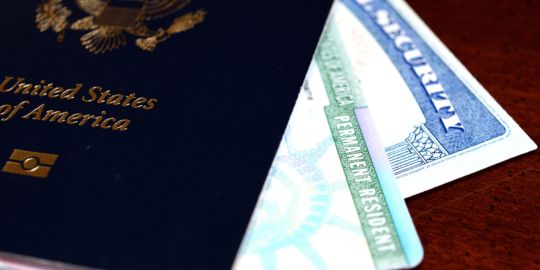The Canadian Super Visa
In July 2022, Canada created a new Super Visa that allows both parents and grandparents to live in the country for 5 years. This visa can be renewed for a further 2 years, bringing the total consecutive length of stay to 7 years. It should be noted that adoptive parents are also eligible for it.
The rules are more flexible than in other countries: you don't need to be a citizen yet; you can be a sponsor as long as you have permanent residence. You also don't need to prove that your parents are sick and unable to take care of themselves – they can relocate just to spend more time around their grandkids, for instance.
The new Super Visa is also flexible compared to previous Canadian visas. For instance, your parents or grandparents can have health insurance from any international provider, not just a Canadian one. Buying insurance from their home country will likely be more cost-friendly. However, you still need to prove that you are capable of taking the financial responsibility for your parents/grandparents. If you live alone, you must earn at least 25,921 Canadian dollars a year to sponsor one dependent parent or grandparent. If you are a couple, you need to collectively earn 32,270 dollars, and if you have one child, have a yearly income of 39,672 dollars.
Despite the flexibility offered, you should be aware that Canada is facing a considerable visa backlog (nearly 3 million visas as of September 2022!). So your application might take a lot of time to be processed, even if measures like digitization are being put into place to solve this backlog.
Sponsoring parents in the United States
The United States offers the possibility of sponsoring your parents, but not your grandparents. The only way to bring your grandparents into the US is to make your parents become green card holders first so that they can then apply for US citizenship (after 5 years) and sponsor their own parents, according to the legal information site AllLaw. Of course, that process takes a lot of time and can even be impossible if your parents don't want to relocate or have passed away.
Interestingly, in the US, you can also sponsor a step-parent, provided that they became your stepfather or stepmother before you turned 18, i.e., they truly had a parental role in your childhood. You can also sponsor adoptive parents, provided you were adopted before the age of 16. You will have to undergo additional procedures when it comes to adoptive parents. It should be noted, however, that you cannot sponsor your biological parents if you gained US citizenship through adoption.
To be able to sponsor your parents in the first place, you need to be a naturalized citizen, not just an expat with permanent residence. Hence, you should consider applying for citizenship and getting dual nationality if your parents are likely to need your care in the future. You should also be at least 21 years old.
As for financial requirements, you must earn at least 125% above the federal poverty level. This level increases the more people there are in your household. For instance, if there are only you and your spouse in your household, this threshold is $22,887 in most states, $26,325 in Hawaii and $28,612 in Alaska, reports the firm Boundless Legal. In contrast, if you and your spouse have two children, i.e., you are a family of four, to bring one of your parents to the US, you would need a minimum income of $34,687 in most states, $39,900 in Hawaii and $43,362 in Alaska.
The form you should look for from the US Citizenship and Immigration Services is the F I-130 form – Petition for Alien Relative. After submitting the application, your parents and you will go through consular processing – submitting other documents, undertaking medical exams (for your parents), attending interviews – before being granted an immigrant visa that's equivalent to a green card. If your parents are already on US territory on a temporary visa, they can alternatively apply through Form I-485 – Application to Register Permanent Residence or Adjust Status. They will need to present at an immigration office for an interview to adjust their status.
Sponsoring parents in Australia
Australia has multiple visas for sponsoring parents: the Subclass 870 Sponsored Parent (Temporary) Visa, the Subclass 103 Parent Visa, the Subclass 804 Aged Parent Visa, and the Subclass 143 Contributory Parent Visa.
These visas concern the parents, not grandparents, of Australian citizens or permanent residents over 18. Like in other countries, biological, adoptive and step-parents are treated equally. For all visas, except the Subclass 143 Contributory Parent Visa, the sponsoring child must accept full financial responsibility for the sponsored parents – housing, medical expenses, food, transport, etc.
The Subclass 143 Contributory Parent Visa, as the name indicates, is for relatively young parents, generally under 65, who want to work or study in Australia. Their sponsors must have been permanent residents of the country for at least two years at the time of application. As it is a permanent visa that gives them the right to employment, it is costly – the total fee is nearly 48,000 Australian dollars – and has a fairly lengthy processing time of about 5 years. This visa also allows parents to subscribe to the public-funded national health insurance Medicare, while other parent visas don't have this privilege.
The Subclass 103 Parent Visa is essentially the same as the Subclass 143 visa. Its fees are lower (6,625 AUD), but it currently has a waiting time of… 30 years! It's an impractical option, given the impossible backlog, so it might be more worthwhile to spend money on the Subclass 143 visa. It should be noted that both the 103 and 143 visas are subject to a “balance of family” test to determine how close the parents' ties to Australia are. 50% of all their children should be residents of Australia to pass the test. That is, if they have 3 kids and 2 are Australian residents, they are eligible; if only 1 is in Australia, they are not eligible. Among other things, it ensures that they have multiple potential caretakers in the country when they can no longer work.
The Subclass 840 Aged Parent Visa is also quite similar to the 143 and 103 visa. Its unique criterion is that the parent must be old enough to receive an old age pension in Australia, i.e., must be 66.5 or 67 years old. This visa has two routes depending on whether the parent is already in Australia on a temporary visa (onshore) or not (offshore).
As for temporary parent visas, the Subclass 870 visa allows parents to stay in Australia for 3 to 5 years. The application fee for the 5-year one is simply higher: 10,180 Australian dollars, as compared to 5,090 dollars for the 3-year visa. The Australian Department of Home Affairs makes it clear that these visa holders cannot work in the country during their stay and must depend on their children or on income from abroad. They can reapply for the visa multiple times until they have reached a cumulative number of 10 years. They cannot reapply for an extension beyond 10 years.
The Dependent Relative Visa in the United Kingdom
The UK has the Adult Dependent Relative Visa that allows naturalized citizens and expats with Indefinite Leave To Remain (ILR) – permanent residence – to bring both their elderly parents and grandparents to live with them. The London-based legal firm Gulbenkian Andonian Solicitors says that, even if this visa still exists, it has been harder to obtain since 2012 due to a changing political climate, a more meandering application process and more stringent rules.
You need to prove that, as a result of age, illness or disability, your parents/grandparents are unable to take care of themselves and perform daily tasks (dress themselves, cook, clean, etc.). This must be backed by an expert medical report about their long-term health conditions. You also need to prove that there is no other relative in their country of origin – siblings who didn't immigrate, for instance – to take care of them. The level of care they need must be proven to be unavailable or unaffordable in their country. For example, a nursing home might be unaffordable on their pension back home.
You must show proof of financial ability through payslips, bonds, bank statements, bills and tax slips, mortgage or tenancy agreement, etc. to take care of your elderly relatives in the UK without them relying on public funds, including on the NHS's free health services, clarifies another London-based legal firm, Richmond Chambers LLP. Each application is analyzed by an Entry Clearance Officer on a case-by-case basis, taking into consideration details like the exact region your parents/grandparents are from (Rural or urban? With good facilities or not?). Success rates have been lower since 2012, so some applications can get rejected over details.
Sponsoring parents and in-laws in Spain
Spain has no specific visa category for parents/grandparents per se, but it can host non-EU parents and in-laws who are at least 65 when “there are reasons substantiating the need to authorize their residence in Spain,” specifies the Spanish Ministry of Foreign Affairs. You can sponsor both your parents and your spouse's parents – but not your grandparents. In addition, you yourself must have been living in Spain for at least 5 years and must have a long-term residence card.
You must prove they need to be financially and physically under your care. You must submit documents proving that, over the past year, you transferred funds to them worth at least 51% of their country of origin's GDP per capita to help them meet their cost of living. For example, if your parents are from Morocco, where the GDP per capita is about 3000 US dollars, you need to show that you sent them at least 1530 dollars (or around 1585 euros) last year. Your parents or in-laws will also need to disclose their income and properties. If they are wealthy enough to be able to afford a full-time aged carer in their country, they would not be eligible for sponsorship.
Exceptionally, they can join you even if they're under 65, but you will have to provide proof that there are exceptional humanitarian circumstances – serious illness, for instance.
Spain's case is similar to that of many other EU (European Union) countries. Germany has more or less the same regulations for sponsoring a parent who is completely dependent on their adult child. Article 36 of the German Residence Act, or the Aufenthaltsgesetz, allows reunification for relatives in need of “long-term care.”
Shorter stays and visa suspensions in other countries
Other countries allow parent or grandparent reunification for less time – usually a year or less. For example, the French Long Stay Visa allows parents/grandparents to visit their children/grandchildren for 3 months to 1 year.
New Zealand and the Netherlands, meanwhile, have seen suspensions of their parent and grandparent visas. In the Netherlands, it was permanently suspended after the 2010 elections, when the government coalition included an anti-immigration party, as reported by the Hague-based legal firm Mynta Law.
Meanwhile, in New Zealand, the Parent Category visa was temporarily suspended in 2016 and underwent review. When it reopened in 2020, Covid happened, and borders were closed. It's now undergoing a second review, while the outstanding applications are stuck in limbo. This situation is frustrating for many. On Radio New Zealand, the Russian mother of a New Zealand resident says her temporary visa will expire soon, and she'd like to remain by her daughter's side. She stresses that she can perfectly take care of herself financially and mainly wants to be in New Zealand to not feel alone.
If you are a prospective expat with elderly parents or grandparents, when you're choosing which country to relocate to, take into consideration whether you'd be able to easily make them join you at one point – even if it's in 10 or 15 years – when they can no longer take care of themselves.
Spousal reunification or reunification with minor children is part of the immigration law of most countries, but many legal systems oversight the responsibility of grown-up children towards their elderly parents or grandparents. Having flexible parents and grandparents visas prevents high-skilled immigrants and international students from returning to their country – a loss for the economy – mainly because they can't leave their parents alone.
















